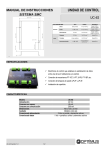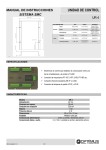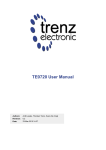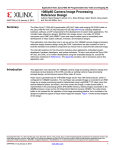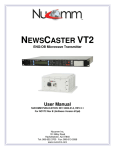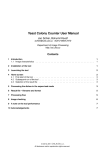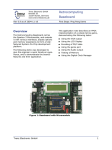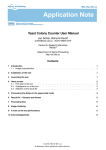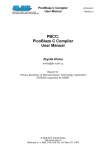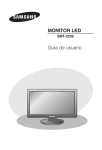Download application note 2015.2 - Signal Processing, UTIA
Transcript
http://sp.utia.cz Application Note Video Input/Output Demonstration for Trenz TE0701-05, TE0720-02-1CF, TE0720-02-1QF, TE0720-02-2IF and Avnet HDMI Input/Output FMC Module Designed with Xilinx Vivado 2015.2 Lukáš Kohout, Jiří Kadlec, Zdeněk Pohl [email protected], [email protected], [email protected] Revision history Rev. 0 1 2 Date 26.08.2015 28.08.2015 Author L. Kohout L. Kohout Description Initial version for Vivado 2014.4 Update to Vivado 2015.2 © 2015 ÚTIA AV ČR, v.v.i. All disclosure and/or reproduction rights reserved. Contents 1 Introduction ...................................................................................................................... 1 2 Description ....................................................................................................................... 1 2.1 HDMIO ...................................................................................................................... 1 2.2 IM-HDMIO ................................................................................................................. 1 2.3 IM-HDMII-HDMIO ..................................................................................................... 1 2.4 IM-VITA-HDMIO........................................................................................................ 2 3 Required HW Resources ................................................................................................. 2 4 TE0701-05 Modification and Setup .................................................................................. 5 5 Demonstrator Startup....................................................................................................... 6 6 Package Content ............................................................................................................. 6 7 References ...................................................................................................................... 7 Disclaimer ............................................................................................................................ 8 Acknowledgement This work has been supported from project EMC2, project number ARTEMIS JU 621429 and MSMT 7H14005. See the project web page http://www.emc2-project.eu/. http://sp.utia.cz ii © 2015 ÚTIA AV ČR, v.v.i. All disclosure and/or reproduction rights reserved 1 Introduction This document describes a video interfacing of Trenz TE0701-05 carrier board [1] with TE0720-02-1CF, TE0720-02-1QF or TE0720-02-2IF FPGA modules (System on Module SoM, [2]) and Avnet HDMI Input/Output FMC Module (FMC IMAGEON) [3]. Trenz SoMs are compatible with EMC2-DP carrier [4] currently developed by Sundance. 2 Description This application note describes four different demonstrators, each is precompiled for three SoMs (TE0720-02-1CF, TE0720-02-1QF and TE0720-02-2IF). Xilinx Vivado 2015.2 has been used as the design tool. 2.1 HDMIO HDMIO demo shows how to interface TE0701-05 carrier board HDMI output. It requires a monitor capable of displaying Full HD resolution at 60 frames per second (1080p60); this demo works with fixed video signal 1920x1080p60 (pixel clock is 148.5 MHz). The output image is generated by test pattern generator TPG, test pattern can be changed during the demo runtime. This demo can run without FMC IMAGEON expansion card. 2.2 IM-HDMIO IM-HDMIO is almost the same as the HDMIO demo described in Section 2.1, but the video signal from TPG is routed to FMC IMAGEON HDMI output. The demo allows changing video resolution during the runtime thanks to programmable clock generator on the FMC IMAGEON expansion board. Supported resolutions are presented in Table 1. 2.3 IM-HDMII-HDMIO IM-HDMII-HDMIO is a video pass through demo. Video signal originates from FMC IMAGEON HDMI input then it is stored in the video frame buffer. After that it is read from the frame buffer and drives to FMC IMAGEON HDMI output. Table 2 summarizes supported input video signal resolutions as they are presented by EDID to the input video signal source (PC graphic card). Output resolution can be changed on the fly, supported resolutions are presented in Table 1. If the resolution of the input video signal is less than the output resolution, it will be displayed the input video signal plus black margin to fill the video signal to required output resolution. In case the resolution of the input video signal is greater than the output resolution is required, the output will be created by cropping of the input video signal. This behavior is shown in Figure 1. Table 1: Supported resolutions on FMC IMAGEON HDMI output. Resolution 1920x1080 1920x1200 1600x1200 1680x1050 1280x1024 1028x720 1024x768 800x600 640x480 600x800 Frame rate 60 50 50 60 60 60 60 60 60 60 Pixel clock [MHz] 148.50 128.44 135.00 119.23 108.00 74.25 65.00 40.00 25.19 40.00 http://sp.utia.cz 1/8 © 2015 ÚTIA AV ČR, v.v.i. All disclosure and/or reproduction rights reserved Table 2: FMC IMAGEON HDMI Input EDID - supported input resolutions. Resolution 1920x1080 1680x1050 1600x1200 1440x900 1366x768 1280x1024 1280x960 1280x800 1280x720 1152x864 1152x720 1024x768 800x600 800x480 720x576 720x480 640x480 Frame rate 60 60 50 60 60 60 60 60 60 60 60 60 60 60 60 60 60 Figure 1: Behavior of the IM-HDMII-HDMIO demo when the input resolution is not the same as the output resolution. 2.4 IM-VITA-HDMIO IM-VITA-HDMIO demonstrates interfacing Vita 2000 image sensor [5]. The sensor is connected through LCEDI connector on the FMC IMAGEON expansion card. It provides Full HD (1920x1080) video signal at 60 frames per second. This video signal is stored in the video frame buffer, after that it is read from the buffer and displayed on the monitor via FMC IMAGEON HDMI output. 3 Required HW Resources The list bellow summarizes required HW components to run the demo: Trenz TE0701-05 carrier board [1], Figure 2. Trenz, TE0720-02-1CF, TE0720-02-1QF or TE0720-02-2IF SoM [2], Figure 3. Avnet HDMI Input/Output FMC Module (FMC IMAGEON) [3], Figure 4. Avnet Vita 2000 image sensor [5], http://sp.utia.cz 2/8 © 2015 ÚTIA AV ČR, v.v.i. All disclosure and/or reproduction rights reserved Complete demo kit can be seen in Figure 6. Figure 2: Trenz TE0701-05 carrier board [1]. Figure 3: Trenz TE0720-02-XXX SoM [2] Figure 4: Avnet HDMI Input/Output FMC Module (FMC IMAGEON) [3] http://sp.utia.cz 3/8 © 2015 ÚTIA AV ČR, v.v.i. All disclosure and/or reproduction rights reserved Figure 5: Avnet Vita 2000 image sensor [5]. Figure 6: Demonstrator kit - TE0701-05 + TE0720-02-XX SoM + FMC IMAGEON. http://sp.utia.cz 4/8 © 2015 ÚTIA AV ČR, v.v.i. All disclosure and/or reproduction rights reserved Figure 7: TE0701-05 carrier board modification. 4 TE0701-05 Modification and Setup Before installing SoM on the carrier board TE0701-05 it is necessary to modify PCB connection. The modification and carrier board setup is described in the list below. 1. To use FMC IMAGEON expansion card FMC_CLK1_P and FMC_CLK1_N signals must be swapped on TE0701-05 carrier board. The modification can be done near JB1 connector at the place where both signals are wired on the PCB surface. The modification must be done before installation of the SoM, since the place is located beneath the SoM when installed. Figure 7 shows new wiring goal, J10B pin G2 must be connected to JB1 pin 67, J10B pin G3 must be connected to JB1 pin 65. As HDMIO demo does not use FMC IMAGEON card, this point is not necessary to do in this particular case. 2. Power the carrier board on. 3. Flash the carrier board CPLD with modified firmware, see Package Content Section 6, firmware file CC701_simple_CC701_10_mod.jed. The operation may be done also with SoM already in place as well as FMC extension board). Flashing instruction can be found in Trenz Wiki [4]. Quick guide: a. Use Lattice Diamond software for flashing the CPLD firmware. b. DIP switch S3 labeled ENJTAG must be switched to OFF position. c. Use Lattice Diamond software and CC701_simple_CC701_10_mod.jed file for flash programming. NOTE: modified CPLD firmware bypasses JTAG chain around FMC and allows using DIP switches S3 to set VADJ directly. It also asserts PG_C2M FMC signal high after power on automatically. This removes a need to setup I2C chain and do it by GPIO register in CPLD. http://sp.utia.cz 5/8 © 2015 ÚTIA AV ČR, v.v.i. All disclosure and/or reproduction rights reserved 4. Set S3 ENJTAG switch back to ON position after flashing CPLD. 5. Set VADJ to 2.5 V with S3 dip switch, set position M1 to OFF and position M2 to ON. 6. Plug SoM and FMC IMAGEON in. 5 Demonstrator Startup 1. Connect HDMI input/output and Vita 2000 sensor according to selected demo: a. HDMIO – connect TE0701-05 HDMI output to monitor capable of displaying Full HD resolution at 60 frames per second (1080p60). b. IM-HDMIO – connect FMC IMAGEON HDMI output to monitor capable of displaying Full HD resolution at 60 frames per second (1080p60). c. IM-HDMII-HDMIO – connect FMC IMAGEON HDMI output to monitor capable of displaying Full HD resolution at 60 frames per second (1080p60). Connect valid video signal to FMC IMAGEON HDMI input (output from PC graphic card for instance), Table 1 in Section 2.3 summarizes all resolutions presented by EDID. d. IM-VITA-HDMIO – connect FMC IMAGEON HDMI output to monitor capable of displaying Full HD resolution at 60 frames per second (1080p60). Connect Vita 2000 sensor with FMC IMAGEON board, use LCEDI connector. 2. Connect USB UART cable to J7 connector on TE0701-05 carrier board (JTAG/USB-toSerial). Serial terminal settings: Baud rate – 115200 Data bits – 8 Stop bits – 1 Parity – none Flow control – none 3. Copy Zynq BOOT.bin file to SD card (directly to root). Chose the file according to used SoM (TE0720-02-1CF, TE0720-02-1QF or TE0720-02-2IF) and demo to be run, see Package Content Section 6. 4. Plug the SD card to TE0701-05 slot and power up the carrier board. 5. The serial terminal is used as the user interface. It prints the demo initialization sequence after start and user can execute control commands. 6 Package Content . |- doc/ | `- appnote.pdf |- firmware/ | `- CC701_simple_CC701_10_mod.jed |- pre-built/ |- te0720-02-1cf-hdmio/ | `- BOOT.bin |- te0720-02-1cf-im-hdmii-hdmio/ | `- BOOT.bin |- te0720-02-1cf-im-hdmio/ | `- BOOT.bin |- te0720-02-1cf-im-vita-hdmio/ | `- BOOT.bin |- te0720-02-1qf-hdmio/ | `- BOOT.bin http://sp.utia.cz 6/8 © 2015 ÚTIA AV ČR, v.v.i. All disclosure and/or reproduction rights reserved || || || || || || `- te0720-02-1qf-im-hdmii-hdmio/ `- BOOT.bin te0720-02-1qf-im-hdmio/ `- BOOT.bin te0720-02-1qf-im-vita-hdmio/ `- BOOT.bin te0720-02-2if-hdmio/ `- BOOT.bin te0720-02-2if-im-hdmii-hdmio/ `- BOOT.bin te0720-02-2if-im-hdmio/ `- BOOT.bin te0720-02-2if-im-vita-hdmio/ `- BOOT.bin 7 References [1] Trenz, „TE0701 Carrier Board User Manual,“ 18 02 2014. [Online]. Available: https://wiki.trenz-electronic.de/display/4X5B/TE0701+Carrier+Board+User+Manual. [2] Trenz, „TE0720 User Manual,“ 23 03 2015. [Online]. Available: http://www.trenzelectronic.de/fileadmin/docs/Trenz_Electronic/TE0720GigaZee/documents/TE0720%20User%20Manual-v45-20150323_1407.pdf. [3] AVNET, „HDMI Input/Output FMC Module,“ 26 08 2015. [Online]. Available: http://www.em.avnet.com/en-us/design/drc/Pages/HDMI-Input-Output-FMCmodule.aspx. [4] Sundance, „EMC2-DP – PC/104 ONEBANK CARRIER FOR SOC MODULES,“ 26 08 2015. [Online]. Available: http://www.sundance.technology/som-cariers/pc104boards/emc2-dp/. [5] AVNET, „ON Semiconductor Image Sensor with HDMI Input/Output FMC Bundle,“ 26 08 2015. [Online]. Available: http://www.em.avnet.com/en-us/design/drc/Pages/OnSemiImage-Sensor-with-HDMI-Input-Output-FMC-bundle.aspx. [6] Trenz, „Trenz WiKi - Lattice CPLD Programming,“ 25 08 2015. [Online]. Available: https://wiki.trenzelectronic.de/display/4X5B/TE0701+JTAG+Programming+Guide#TE0701JTAGProgram mingGuide-LatticeCPLDProgrammingLatticeCPLD. http://sp.utia.cz 7/8 © 2015 ÚTIA AV ČR, v.v.i. All disclosure and/or reproduction rights reserved Disclaimer This disclaimer is not a license and does not grant any rights to the materials distributed herewith. Except as otherwise provided in a valid license issued to you by UTIA AV CR v.v.i., and to the maximum extent permitted by applicable law: (1) THIS APPLICATION NOTE AND RELATED MATERIALS LISTED IN THIS PACKAGE CONTENT ARE MADE AVAILABLE "AS IS" AND WITH ALL FAULTS, AND UTIA AV CR V.V.I. HEREBY DISCLAIMS ALL WARRANTIES AND CONDITIONS, EXPRESS, IMPLIED, OR STATUTORY, INCLUDING BUT NOT LIMITED TO WARRANTIES OF MERCHANTABILITY, NON-INFRINGEMENT, OR FITNESS FOR ANY PARTICULAR PURPOSE; and (2) UTIA AV CR v. v. i. shall not be liable (whether in contract or tort, including negligence, or under any other theory of liability) for any loss or damage of any kind or nature related to, arising under or in connection with these materials, including for any direct, or any indirect, special, incidental, or consequential loss or damage (including loss of data, profits, goodwill, or any type of loss or damage suffered as a result of any action brought by a third party) even if such damage or loss was reasonably foreseeable or UTIA AV CR v. v. i. had been advised of the possibility of the same. Critical Applications: UTIA AV CR v. v. i. products are not designed or intended to be fail-safe, or for use in any application requiring fail-safe performance, such as life-support or safety devices or systems, Class III medical devices, nuclear facilities, applications related to the deployment of airbags, or any other applications that could lead to death, personal injury, or severe property or environmental damage (individually and collectively, "Critical Applications"). Customer assumes the sole risk and liability of any use of UTIA AV CR v. v. i. products in Critical Applications, subject only to applicable laws and regulations governing limitations on product liability. Any and all legal disputes that may arise from or in connection with the use, intended use of or license for the demonstrator provided hereunder shall be exclusively resolved under the regional jurisdiction relevant for UTIA AV CR, v. v. i. and shall be governed by the law of the Czech Republic. http://sp.utia.cz 8/8 © 2015 ÚTIA AV ČR, v.v.i. All disclosure and/or reproduction rights reserved










